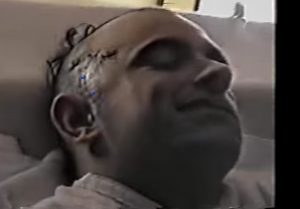As I write this month’s post from my home office, the world around me is shut down as caution to the coronavirus. The writing conference season has come to a screeching halt before it ever got started. Because most conferences have either been postponed or canceled.
As social-distancing has become the norm, I have had more time to think about a lot of things. I know a lot of writers, both established and aspiring are disappointed by lost opportunities to pursue their passions or missed chances to reunite with other writing friends.
But, I can’t help but shake the memories and feelings I had over two decades ago when my life literally came to a screeching halt. It seemed like everything had been taken away from me: dreams, finances, relationships and even some physical abilities.
You could say, my life was over with as I knew it. But, it wasn’t over—it was just a turning point in my life that would put me on a new course. I’ve shared how difficult it can be to live with a brain injury.

But since, this month is brain injury awareness month I want to share with you some insights I have learned from navigating the hurdles life has thrown at me. Because as the world is learning now, you don’t have to have a disability to experience the trials in life.
Below are a few truths about life we can bet on.
- Everyone struggles at times in life.
- Just because you get knocked down in life, doesn’t mean it’s over with.
- Slow down and learn to listen when life pauses.
Setbacks in life prepare us for what may lie ahead on our journey. By now we all know that writing isn’t an easy career. There are hurdles to jump. How we handle the setbacks will determine how our careers go.
Setbacks?
I googled the definition for setback and found a couple of interesting definitions: “1) A checking of progress 2) A space between buildings. 3) Automatic scheduled adjustment to a lower temperature setting of a thermostat.”
It’s interesting because these characteristics of setbacks apply to all facets of life, especially the writing life. Setbacks help us gauge the progress of our writing, they give us space and time to think, and they help us make adjustments to our writing.
Setbacks should help us focus, not make us fearful. I think our country and world have been humbled by the coronavirus. Hopefully we can learn from this setback.
About eight months after I had my accident, I suffered my first seizure and was scared to death. It took me two days after going to the emergency room to regain the movement in my left arm. For two days I cried because I thought all the progress I’d made over the previous eight months was lost. I was sure I would never walk again or be able to use my left arm. It wasn’t until eight years later when I had my second seizure that I began to connect the dots.
My seizures were triggered by becoming dehydrated. Once I made the correct adjustments to my life to avoid those situations, I have become seizure-free for over a decade, without any medication or doctor visits. Setbacks can teach us something if we pay attention.
I recently reached out to one of my writing mentors for some advice about navigating the hurdles of a writing career. She agreed that there are many. She was the one who first who noticed and helped me hone my writing voice. The following list is a compilation of hurdles that I have experienced along with some from my closest writing friends.
- Finding your “writing” voice.
- Finding your target market.
- Building your platform.
- Finding an editor that fits.
- Landing representation for your writing projects.
- Securing a publishing contract.
- Book marketing.
These are only a few hurdles I’ve heard about within the writing community. There will always be unplanned hiccups in the writing life, in life and definitely living with a disability.
These are times when patience and persistence are vital to a writer. After I had that first seizure I wanted to just give up completely, but then I learned to use it as a tool on my road to recovery. Write on!
Hang On?
Whether I’m at a writer’s conference or listening to online teleseminar, I always hear the same thing.
- Don’t give up.
- Keep learning.
- Listen.
- It’s okay to ask for help/advice.
Although I had therapists twenty years ago, there was no one I could turn to who could explain to me what my life would be like after losing 30% of my brain.
Now I have the opportunity to encourage other brain injury/stroke survivors about what to expect. I am also fortunate enough to have established writers in my life to help me navigate the writing hurdles.
As the world pauses to deal with the coronavirus, it is a great time to ask for help, listen and continue to learn our craft. That is the best way to make the most out of this setback.

Martin Johnson survived a severe car accident with a (T.B.I.) Traumatic brain injury which left him legally blind and partially paralyzed on the left side. He is an award-winning Christian screenwriter who has recently finished his first Christian nonfiction book. Martin has spent the last nine years volunteering as an ambassador and promoter for Promise Keepers ministries. While speaking to local men’s ministries he shares his testimony. He explains The Jesus Paradigm and how following Jesus changes what matters most in our lives. Martin lives in a Georgia and connects with readers at Spiritual Perspectives of Da Single Guy and on Twitter at mtjohnson51.




No Comments